Bank Statement PDF to CSV
Convert your Bank statement PDF to CSV easily with accurate formatting. Simplify data handling, save time, and manage your financial records effortlessly.
Add Your File
Drag & Drop Or Select File
Data security is our top priority
Bank Statement Converters prioritises the confidentiality and integrity of your data. As a testament to our commitment, we adhere to stringent compliance standards, including GDPR, SOC 2, and HIPAA. Privacy Policy



How to Convert a Bank Statement from PDF to CSV
Why Choose Bank Statement PDF to CSV?
Accessibility
You can access Bank Statement Converter anytime from any device. It works online, making your bank statement conversion simple, quick, and hassle-free for everyone.
Affordable Plans for Everyone
Affordable Plans for Everyone tailored to meet diverse needs without breaking the bank, offering flexibility and value for all.
Starter
$90 / month
Save 10% annually
Why should you take this
4,800 pages per year
PDF Bank Statement to Excel
PDF Bank Statement to CSV
Convert Password Protected Statement
Multiple PDFs to a Single CSV
Global Banks Supported
Get Started
Professional
$180 / month
Save 20% annually
Why should you take this
12,000 pages per year
PDF Bank Statement to Excel
PDF Bank Statement to CSV
Convert Password Protected Statement
Multiple PDFs to a Single CSV
Global Banks Supported
Get Started
Business
$360 / month
Save 20% annually
Why should you take this
48,000 pages per year
PDF Bank Statement to Excel
PDF Bank Statement to CSV
Convert Password Protected Statement
Multiple PDFs to a Single CSV
Global Banks Supported
Get Started
Most Popular
Enterprise
$Custom / month
Save 20% annually
Why should you take this
PDF Bank Statement to Excel
PDF Bank Statement to CSV
Convert Password-Protected Statement
Multiple PDFs to a Single CSV
Global Banks Supported
Get Started
PDF Bank Statement to CSV Converters vs. Free Online Tools
Features
Bank Statement PDF to CSV Converter
Free Online Tools
Data accuracy
Privacy and data encryption
Batch processing support
Clean and structured CSV output
No ads or distractions
Bank specific formatting
Error handling and correction
Customer support or helpdesk
File size flexibility
Offline desktop availability
Frequently Asked Questions
Will the formatting of my bank statement remain the same after conversion?
Can I automate the bank statement PDF to CSV conversion process?
What should I do if the converted CSV file has missing data?
Stuck with bank statements in PDF that feel impossible to work with? You waste hours copying data, risking errors. The smart fix? Convert your bank statement PDF to CSV instantly for easy editing, sorting, and analysis. With the right tools, you get clean, organized data in minutes.
This guide shares simple methods, explores top tools, and helps you manage financial records effortlessly. Stay here—you’ll learn everything to turn those rigid PDFs into editable CSV files without stress or wasting time.
What Is a Bank Statement PDF to CSV?
A bank statement PDF to CSV is a file conversion process that turns your bank statement from PDF format into CSV. It helps you extract transaction data like dates, amounts, and descriptions, making it easier to edit, analyze, or manage financial records.
Converting your bank statement from PDF to CSV allows you to work with your data easily. Unlike PDF files, a CSV file opens directly in spreadsheet programs like Excel or Google Sheets. You can sort, filter, or calculate transactions without typing anything manually.
Additionally, using a bank statement PDF to CSV converter saves time and reduces errors. The tool captures important details like amounts, balances, and descriptions. As a result, you manage your expenses better, prepare financial reports faster, and avoid missing key information.
Why Do Banks Provide Statements in PDF Format?
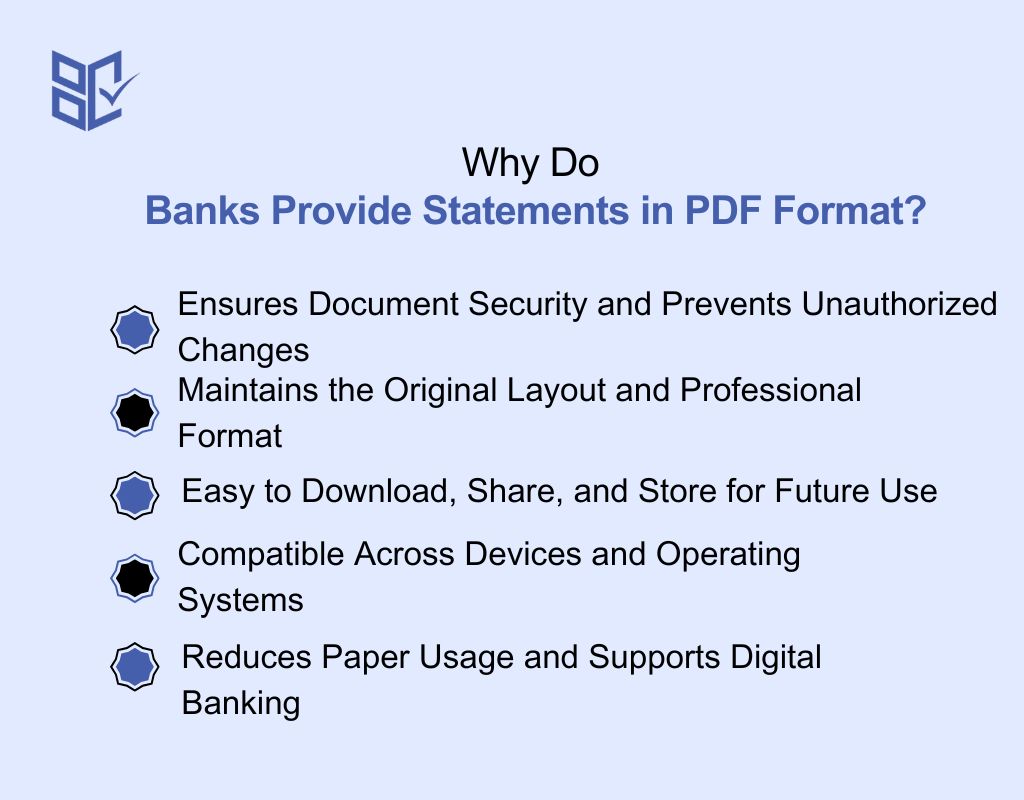
Banks choose PDF format to give you secure, clear, and easy-to-use statements. It protects your financial data while ensuring easy access whenever you need to check your records.
Ensures Document Security and Prevents Unauthorized Changes
PDF files protect your bank statement from unwanted edits or tampering. You can view your transactions, but no one can change the data. This keeps your financial records accurate, safe, and secure when storing, sharing, or submitting them for official or personal use.
Maintains the Original Layout and Professional Format
PDF preserves the exact design, layout, and professional format of your bank statement. It keeps all tables, headers, footers, and calculations clear. This way, you can easily review your balances, transaction summaries, and charges without facing formatting errors or confusion, even if you open it years later.
Easy to Download, Share, and Store for Future Use
PDF statements are easy to download from your bank account anytime. You can store them on your phone, computer, or cloud safely. They’re simple to print or share when needed, helping you keep records ready for tax filing, audits, or financial reviews without worrying about document loss. They’re also supported by online bank statement export options for easier access.
Compatible Across Devices and Operating Systems
PDFs open the same way on all devices, including phones, tablets, or computers. You don’t need special software to view them. This compatibility ensures you can access your statement anywhere, anytime, without struggling with software errors or device restrictions, making your banking experience smoother and stress-free.
Reduces Paper Usage and Supports Digital Banking
Banks prefer PDF statements because they reduce paper waste and printing costs. By offering digital copies, banks support eco-friendly practices while giving you instant access to records. You don’t need to wait for postal delivery or worry about losing paper statements anymore, making banking faster and more convenient.
Top Reasons to Convert Bank Statement PDF into CSV Format
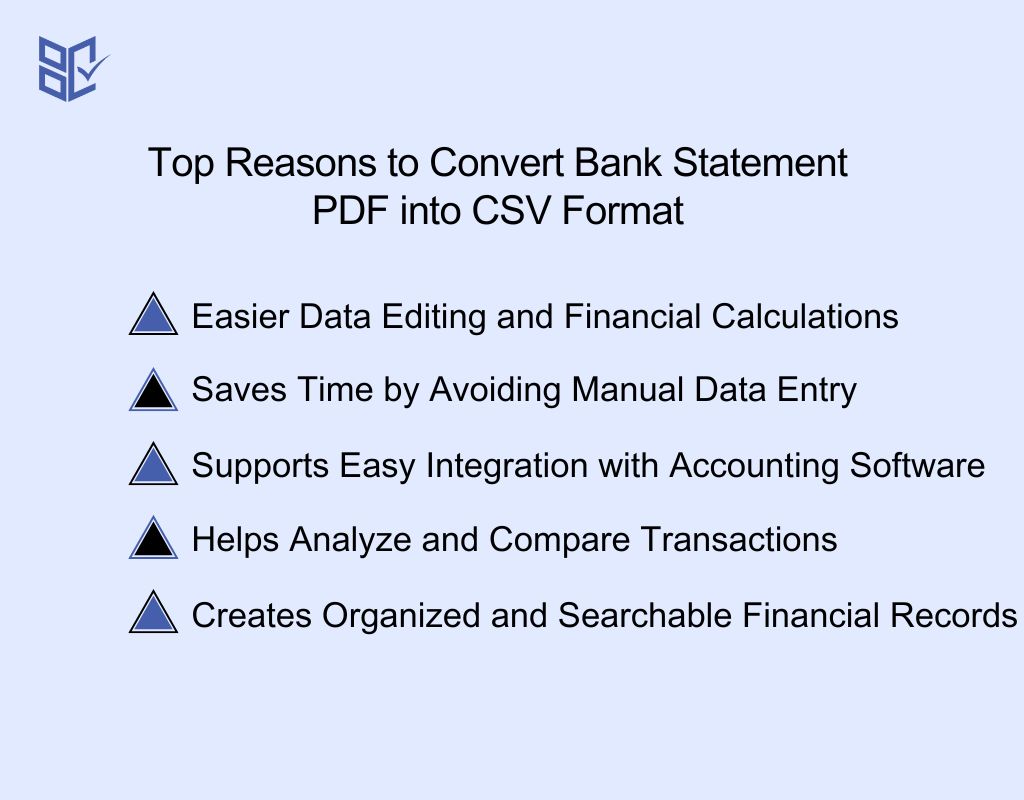
Converting your bank statements from PDF to CSV makes handling financial data easier. It helps you manage, edit, and analyze transactions without wasting time or facing manual errors. Here’s why you should convert bank statement PDF to CSV:
Easier Data Editing and Financial Calculations Anytime
CSV files open easily in Excel or Google Sheets, letting you edit data quickly. You can add formulas, calculate totals, and filter transactions easily. This flexibility helps you manage budgets, track expenses, and prepare financial reports faster without copying data manually from a PDF file.
Saves Time by Avoiding Manual Data Entry
PDF files are hard to edit and require manual typing for analysis. Converting to CSV saves time because your transactions are already in organized columns. You skip manual data entry, reduce errors, and finish tasks like bookkeeping, tax filing, or monthly reports faster and with better accuracy.
Supports Easy Integration with Accounting Software
CSV files work smoothly with accounting tools like QuickBooks or Xero. You can upload the file directly and avoid retyping every transaction. This makes expense tracking, report generation, and business financial management simple, especially if you handle large transactions or need professional reports regularly.
Helps Analyze and Compare Transactions Over Time
CSV format allows you to sort, filter, and compare transactions over different periods. You can easily spot spending patterns, unexpected charges, or track recurring payments. This analysis helps you make smarter financial decisions and manage personal or business finances more efficiently without struggling to check each transaction manually.
Creates Organized and Searchable Financial Records
Unlike PDFs, CSV files make your financial records searchable. You can find specific transactions, amounts, or dates easily without scrolling through pages. This organized format helps when checking past payments, verifying bank charges, or preparing audit reports, making your financial tracking more efficient and stress-free.
What Makes PDF to CSV Conversion Work So Well?
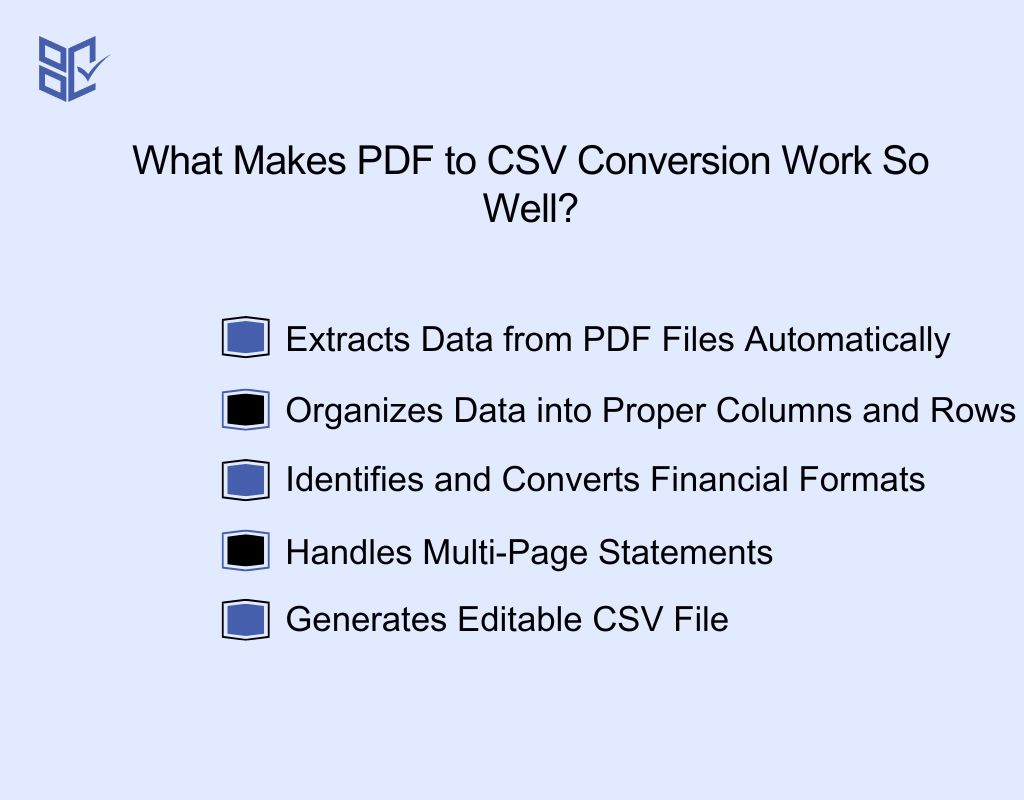
A PDF to CSV converter reads your bank statement and turns it into an editable file. It extracts your data accurately and organizes it for easy use. Here’s how bank statement PDF to CSV converter online works:
Extracts Data from PDF Files Automatically
The converter scans your PDF file and detects key data like dates, descriptions, and amounts. It reads structured or scanned bank statements without needing manual typing. You get your transactions ready in columns, saving time and reducing errors caused by copying data line by line.
Organizes Data into Proper Columns and Rows
The tool arranges your extracted data into a neat table format. Each transaction fits perfectly into columns like Date, Description, Amount, and Balance. This organized structure helps you read, sort, and calculate your financial records easily without adjusting the data manually after conversion.
Identifies and Converts Financial Formats Correctly
It understands financial formats like currency symbols, decimal points, and negative amounts. The converter keeps these details accurate in the CSV file. This prevents confusion or mistakes while analyzing transactions, ensuring your financial reports or bookkeeping records stay correct and usable.
Handles Multi-Page Statements Without Losing Data
The converter processes large or multi-page bank statements in one go. It keeps every page, line, and transaction intact during conversion. You don’t lose any data, which is important for monthly reports or bulk statement processing when handling business or personal finances.
Generates Editable CSV File Ready for Use
After processing, the converter creates a CSV file you can download immediately. The file opens in Excel, Google Sheets, or accounting software. You can edit, calculate, or share your data quickly without formatting issues, making your financial tasks much easier.
Must-Have Features in a PDF to CSV Bank Statement Converter
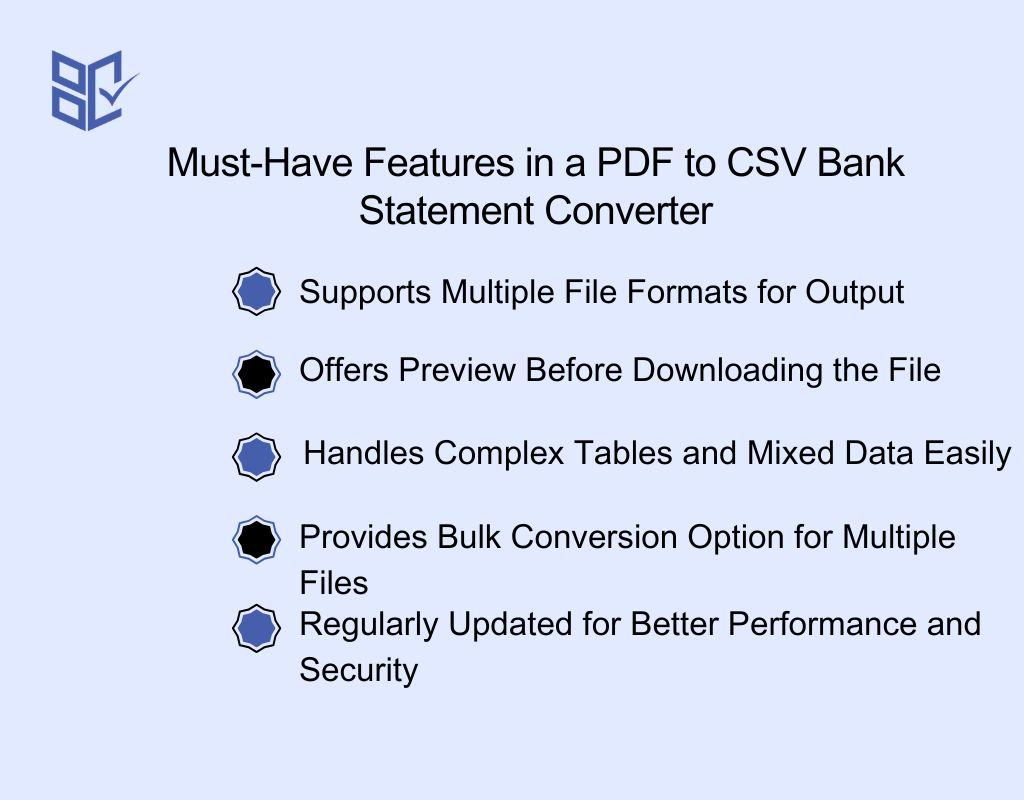
Finding the right bank statement converter is important. It helps you convert files easily, handle complex data, and avoid extra work during financial reporting or record-keeping. Here’s what you should look for while picking the right converter:
Supports Multiple File Formats for Output
Choose a converter that allows downloads in multiple formats like CSV, XLS, and XLSX. This flexibility helps you work with different accounting software or tools without converting files again, saving time and effort during your financial tasks or reports.
Offers Preview Before Downloading the File
Look for a tool that gives a preview of extracted data before download. This helps you check accuracy, formatting, and missing data early. You can correct errors quickly, ensuring your final file is clean and ready for immediate use without rework.
Handles Complex Tables and Mixed Data Easily
A good converter processes bank statements with complex tables, mixed data, and multiple currencies. It keeps your transaction details clear, structured, and easy to read. You avoid losing valuable information or facing messy outputs that require extra time to fix later.
Provides Bulk Conversion Option for Multiple Files
If you handle several bank statements, choose a converter offering bulk processing. This feature lets you upload and convert multiple PDFs at once, reducing repeated tasks. It’s perfect for businesses, accountants, or users managing financial records from multiple bank accounts efficiently.
Regularly Updated for Better Performance and Security
Choose a converter that receives regular updates for better speed, new features, and improved security. This keeps your data safe, prevents system errors, and ensures the tool handles the latest bank statement formats, giving you accurate results every time you convert files.
Best Practices for Managing Converted CSV Files
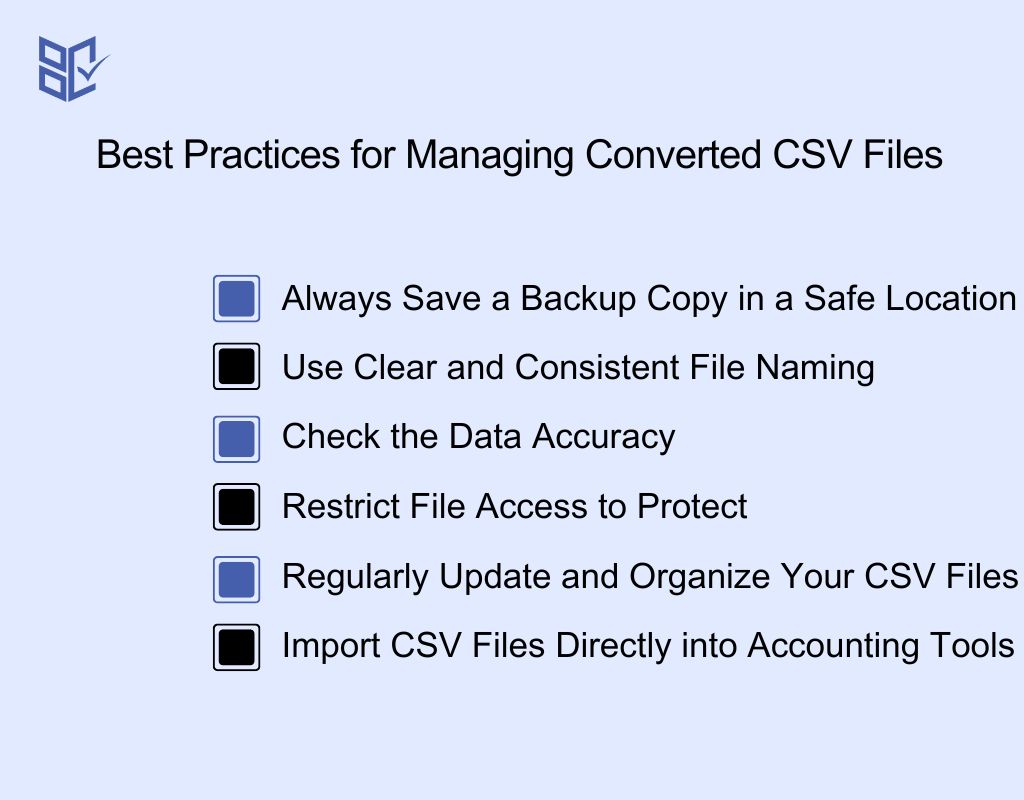
After converting your bank statement to CSV, manage the file properly to keep your data safe, organized, and easily accessible. Here are the best practices to follow:
Always Save a Backup Copy in a Safe Location
Keep a backup of your converted CSV file in a secure folder or cloud storage. This protects your data if the original file gets lost, corrupted, or accidentally deleted. Backups help you recover your financial records anytime without starting the conversion process again.
Use Clear and Consistent File Naming for Easy Access
Name your CSV files properly by including the bank name and statement period. For example, “ABC_Bank_Jan2024.csv.” Clear names help you find the right file quickly during audits, tax season, or while reviewing past transactions without confusion.
Check the Data Accuracy After Every Conversion
Review your CSV file carefully after conversion. Check if the dates, descriptions, amounts, and balances match your original statement. Spotting and correcting errors early saves time and prevents problems when analyzing financial data or sharing the file with your accountant.
Restrict File Access to Protect Sensitive Information
Your converted CSV contains sensitive financial data. Restrict access by storing it in password-protected folders or sharing it only with trusted people. This keeps your banking information safe from unauthorized users and prevents misuse of your personal or business data.
Regularly Update and Organize Your CSV Files
Keep your CSV files updated and organized in monthly or yearly folders. Regular organization helps you track expenses easily, find specific files quickly, and stay prepared for financial reviews, tax filings, or audits without wasting time searching through random files.
Import CSV Files Directly into Accounting Tools
Use your CSV files with accounting software like QuickBooks, Xero, or Google Sheets. Direct import saves you from re-entering data manually and helps in generating reports, analyzing transactions, or balancing accounts faster and more accurately for personal or business finances.
Most Reliable PDF to CSV Converters for Bank Statements
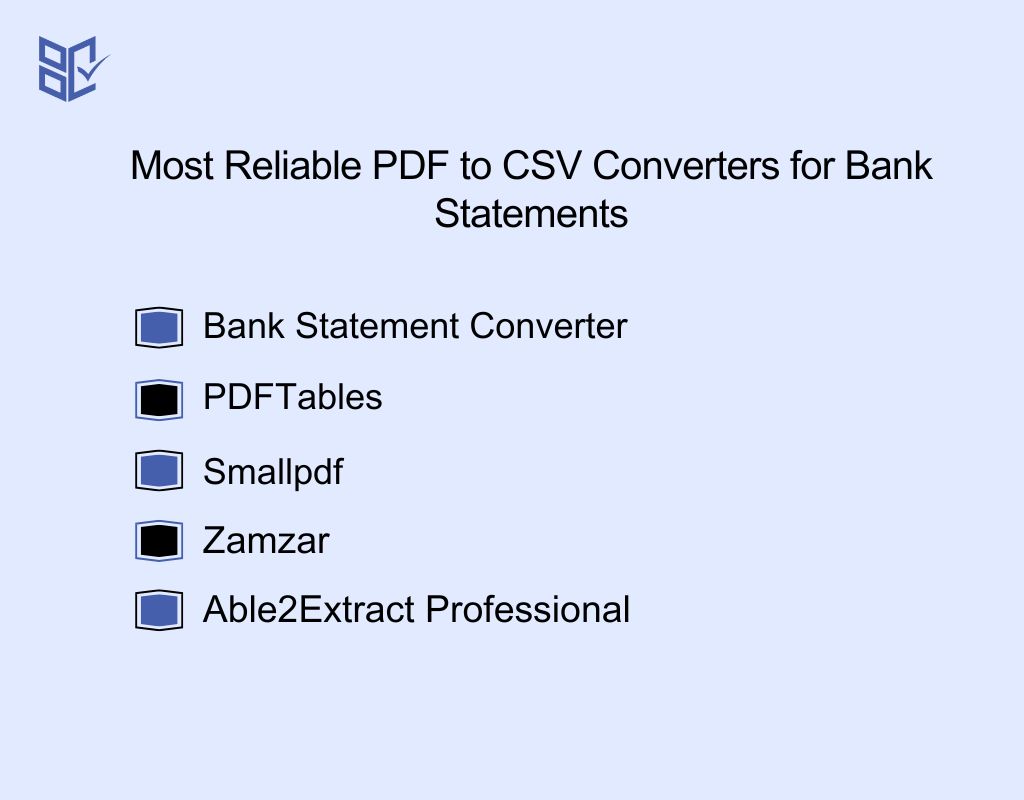
Finding the right tool helps you convert bank statements easily without losing important data. Below are the best tools that simplify your PDF to CSV conversion process:
Bank Statement Converter
Bank Statement Converter specializes in converting bank PDFs to clean CSV files. It accurately extracts transactions, balances, and dates. The tool supports scanned and digital PDFs, bulk processing, and automatic file deletion. You get editable files ready for accounting, analysis, or tax filing within minutes, making your work easier.
PDFTables
PDFTables converts PDF bank statements into structured CSV or Excel files. It detects tables and maintains formatting during conversion. The tool supports scanned documents but may require manual review for accuracy. It works well for financial data extraction and offers an API for developers needing batch conversions or automated workflows.
Smallpdf
Smallpdf offers a quick PDF to Excel converter that can handle simple bank statements. After converting to Excel, you can save the file as CSV. It’s easy to use but may struggle with complex or scanned PDFs. This tool is ideal if you handle basic statements without many data formatting needs.
Zamzar
Zamzar supports PDF to CSV conversion online without needing software installation. You upload the bank statement and choose the output format. It works for simple files but may miss detailed financial formatting. Zamzar is useful for quick, one-time conversions if you need fast results with fewer technical requirements.
Able2Extract Professional
Able2Extract Professional offers advanced PDF to CSV conversion features with high accuracy. It allows manual selection of tables, custom extraction, and complex layout handling. The tool is best for businesses managing large or detailed bank statements regularly. However, it requires a paid license and software installation for full features.
Conclusion
Converting your bank statement PDF to CSV is no longer optional—it’s the smart move for better control over your finances. It saves time, reduces errors, and helps you manage data effortlessly. Now, you can analyze transactions, track expenses, or prepare reports without struggling.
The right tool makes this entire process simple and accurate. So, start converting your statements today and handle your financial records like a pro. This guide has everything you need to simplify the process and avoid common mistakes along the way.